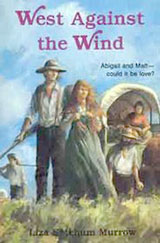
|
West Against the Wind
About the Book Fourteen-year-old Abigail Parker, traveling west in 1850, has a touch of “gold fever.” A spirited rebel, Abby dreams of buying her own land and hopes to find her father, missing in California. Caught up in the danger and adventure of the journey, Abby befriends Matthew Reed, a mysterious young man with a secret. As the wagon train flounders in the snow, Abby and Matthew struggle over the Sierra Nevada mountains in a final attempt save their loved ones. Awards and Distinctions Iowa Teen Award list Reviews “A wise, entrancing story with unusually well-defined characters, a strong point of view, and a rich web of conflicts. An exceptionally fine debut.” (Publishers Weekly) Behind the Book FAQ: What inspired you to write this story? What I was a teenager, I read The Personal Narrative of James Ohio Pattie, my ancestor’s exaggerated but exciting story of his life as a trapper and gold seeker in the West. That book kindled my interest in Western history but I never traveled West until much later, when I was grown and my sons were little. We drove from Vermont to California, camping or staying in motels, and I began to wonder what that journey was like before there were roads, comfortable campgrounds, fast food restaurants, and gas stations. I lived in California for a year, and read a lot about the California gold rush. Most of the books focused on the lives of men. What was it like for girls and women who made the difficult journey west in the 1840s and 1850s? I wrote this book to answer that question. FAQ: Why did you make Abby such a rebel? When I was Abby’s age, I thought the rules about how girls and women should behave were silly or unfair, so I understood Abby’s rebel spirit. During Abby’s time (the 1850s) girls were expected to behave in ways that we would find confining today. Yet often, as girls and women moved West, the rules changed. Women who led sheltered lives in the East suddenly faced wild animals, dangerous travel, sickness, lack of food, and serious accidents. Women and men worked together to overcome these difficulties, and many girls and women became more independent. I decided that the most interesting character for my novel would be a girl like Abby who challenged the rules but also found the courage to help others as the wagon train struggled to reach California. |
 |
 |
 |
 |
